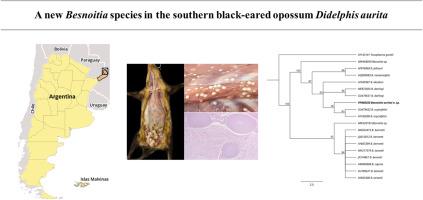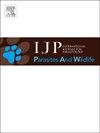南方黑耳负鼠Didelphis aurita中的一个假定的Besnoitia新物种
IF 2
3区 医学
Q3 ECOLOGY
International Journal for Parasitology-Parasites and Wildlife
Pub Date : 2024-09-21
DOI:10.1016/j.ijppaw.2024.100998
引用次数: 0
摘要
Besnoitia spp.是一种包囊形成的球虫寄生虫,寄主范围很广,可感染各种野生和家养动物。北美负鼠(Didelphis virginiana)感染达拉里氏球虫后会受到严重影响。本研究介绍了阿根廷米西奥内斯(Misiones)一只在公路上被杀死的雌性南方黑耳负鼠(Didelphis aurita)感染Besnoitia的病例。在几块肌肉和内脏器官中观察到许多 0.5-1 毫米的囊肿,显微镜下可在骨骼肌、舌头和心脏中发现这些囊肿。组织学分析表明,多个球形囊肿内有无数类似臂孢子虫的细胞,囊壁轮廓分明。观察到少量退化和破裂的囊肿,周围有轻度至中度炎症。从单个囊肿和肌肉中提取了基因组 DNA,并通过 PCR 成功扩增了沙囊虫原生动物的 ITS1 标记和 18S rRNA 基因片段,并对其进行了测序。18S 序列与 B. darlingi 和 B. oryctofelisi 的序列显示出 100%的一致性。比较完整的 ITS1 序列(259 bp)发现,与 B. oryctofelisi 的同一性为 99.2%,与 B. darlingi 的同一性为 97.7%。这一结果与系统发育定位一起表明,本案例中的 Besnoitia sp.与 B. darlingi 不同,与 B. oryctofelisi 关系密切。本文章由计算机程序翻译,如有差异,请以英文原文为准。

A putative new Besnoitia species in the southern black-eared opossum Didelphis aurita
Besnoitia spp. are cyst-forming coccidian parasites with a broad host range, infecting various wild and domestic animal species. Northamerican opossums (Didelphis virginiana) are severely affected by the infection with B. darlingi. This study presents a case of infection with Besnoitia in a road-killed female southern black-eared opossum (Didelphis aurita) in Misiones, Argentina. Many 0.5–1 mm cysts were observed in several muscles and visceral organs and were microscopically identified in skeletal muscles, tongue, and heart. Histological analysis disclosed multiple spherical cysts with a myriad of bradyzoites like-cells and a well-defined cyst wall. A small number of degenerate and ruptured cysts, surrounded by mild to moderate inflammation were observed. Genomic DNA from an individual cyst and muscle was extracted and ITS1 marker and 18S rRNA gene fragments from sarcocystid protozoa were successfully amplified by PCR and sequenced. The 18S sequence exhibited 100% identity with sequences of B. darlingi and B. oryctofelisi. Comparison of the complete ITS1 sequence (259 bp) revealed an identity of 99.2% with B. oryctofelisi and 97.7% with B. darlingi. This result together with the phylogeny positioning, suggest that the Besnoitia sp. in the present case differ from B. darlingi, being closely related with B. oryctofelisi.
求助全文
通过发布文献求助,成功后即可免费获取论文全文。
去求助
来源期刊

International Journal for Parasitology-Parasites and Wildlife
Medicine-Infectious Diseases
CiteScore
3.80
自引率
5.60%
发文量
113
审稿时长
45 days
期刊介绍:
The International Journal for Parasitology: Parasites and Wildlife (IJP-PAW) publishes the results of original research on parasites of all wildlife, invertebrate and vertebrate. This includes free-ranging, wild populations, as well as captive wildlife, semi-domesticated species (e.g. reindeer) and farmed populations of recently domesticated or wild-captured species (e.g. cultured fishes). Articles on all aspects of wildlife parasitology are welcomed including taxonomy, biodiversity and distribution, ecology and epidemiology, population biology and host-parasite relationships. The impact of parasites on the health and conservation of wildlife is seen as an important area covered by the journal especially the potential role of environmental factors, for example climate. Also important to the journal is ''one health'' and the nature of interactions between wildlife, people and domestic animals, including disease emergence and zoonoses.
 求助内容:
求助内容: 应助结果提醒方式:
应助结果提醒方式:


